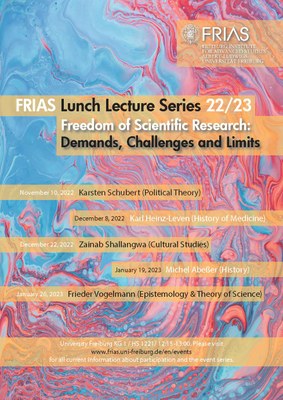Freedom of Scientific Research: Demands, Challenges and Limits
Freedom of Scientific Research: Demands, Challenges and Limits
 In its Bonn Declaration on Freedom of Scientific Research, signed in October 2020, the Ministerial Conference on the European Research Area declared academic freedom a centrepiece for democratic societies:
In its Bonn Declaration on Freedom of Scientific Research, signed in October 2020, the Ministerial Conference on the European Research Area declared academic freedom a centrepiece for democratic societies:
“Freedom of scientific research stands for openness, exchange, excellence, internationalism, diversity, equality, integrity, curiosity, responsibility and reflexivity. It is therefore a pillar of any democracy. Research and the freedom to conduct research are indispensable prerequisites for our social, cultural, political and economic resilience and progress. […] Freedom of scientific research is a necessary condition for researchers to produce, share and transfer knowledge as a public good for the well-being of society.”
Today, in line with this statement, many political actors express highest expectations towards and appreciation for academic freedom. Research facts become increasingly important for political decisions. But how free is research really? Ethical standards define its limits. Societal and religious groups as well as large political factions seemingly turn away from research based policies and academic freedom. Research and researchers are at risk. Academic events are cancelled due to external pressure. Demonstrations against the COVID-19 measures and against the climate catastrophe reveal that the values of “enlightenment” and free research are under debate. If the world is at risk, how free can research remain? How do human responsibility for our planet and freedom of research effect each other?
Due to these complex questions and obvious conflicts, the FRIAS Lunch Lecture Series in the winter term 2022/23 wants to explore the topic of Academic Freedom, its demands, challenges and limits from multiple international, transdisciplinary and transgenerational perspectives. We want to inquire into various aspects by addressing topics like the following from the perspective of different academic perspectives:
- Ethical dimension and limits of academic freedom
- Academic freedom in Eastern (Central) Europe
- Academic Freedom and Cancel Culture
- Academic freedom in the climate catastrophe
- Academic freedom and structures of higher education and career paths
- Academic freedom and the media
- Academic freedom and self-censorship
The FRIAS Lunch Lectures Series are dedicated to reflecting on knowledge, science and technology in the broadest sense. Each semester introduces an overarching guiding question, addressed Thursdays between 12:15 and 13:00 by current FRIAS Fellows and Freiburg based researchers from the point of view of their disciplines.
The aim of this lecture series is to offer both undergraduate and graduate students and, essentially, everyone interested in public and open exchange on knowledge and science, a first-hand up-to-date account of research projects at FRIAS and of FRIAS’ interdisciplinary objectives, with the opportunity to engage in critical debate.

